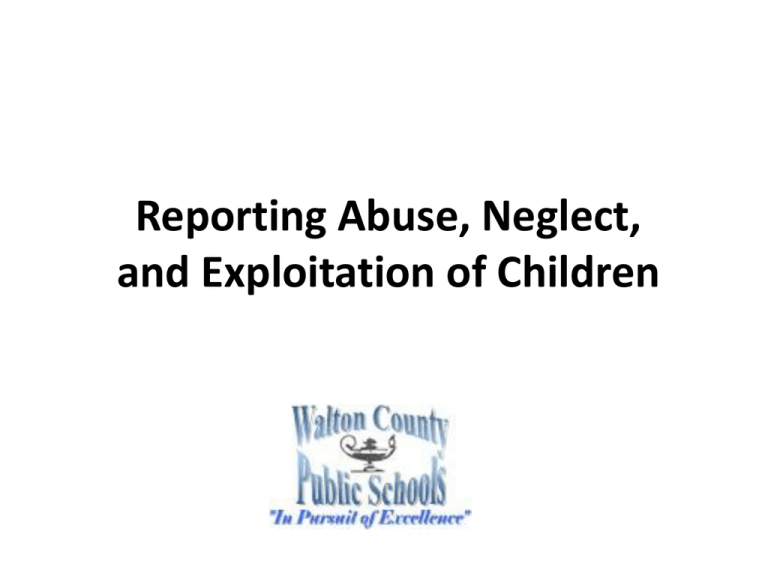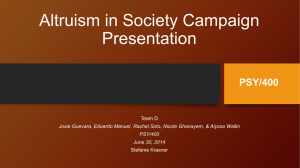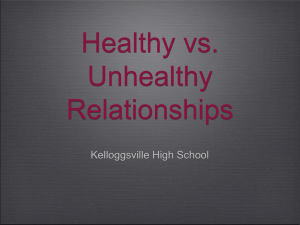
Reporting Abuse, Neglect,
and Exploitation of Children
What is child abuse?
As an employee or volunteer of Walton
County School District—and as a responsible
citizen—you need to know that child abuse
cannot be tolerated in any form.
Categories of child abuse that would require
being reported include:
•
•
•
•
•
•
•
Physical abuse
Neglect
Sexual abuse
Commercial sexual exploitation
Emotional abuse
Domestic violence
Drug use or sales in the home
PHYSICAL ABUSE
The non-accidental physical injury of a child. Physical abuse is the most
visible and widely recognized form of child abuse.
In Georgia, Corporal Punishment is legal. Abuse is not.
Corporal punishment is any physical punishment of a child to inflict pain as a
deterrent to wrongdoing. It may produce transitory pain and potential
bruising. If pain and bruising are not excessive or unduly severe and result
only in short-term discomfort, this is not considered maltreatment.
-Georgia DFCS
NEGLECT
The failure of a parent, guardian, or other caregiver to
provide for a child’s basic needs.
Neglect may be:
•
•
•
•
•
The failure of a parent, guardian, or other caregiver to provide
for a child’s basic needs, including safety from harm or danger
(failure to protect).
Physical (e.g., failure to provide necessary food or shelter, or
lack of appropriate supervision this also includes the failure to
protect a child from harm/danger.)
Medical (e.g., failure to provide necessary medical or mental
health treatment)
Educational (e.g. failure to educate a child or attend to special
education needs)
Emotional (e.g., inattention to a child’s emotional needs,
failure to provide psychological care, or permitting the child to
use alcohol or other drugs)
NEGLECT
Child Protective Services guidelines for supervision:
Children eight years or younger should not be left alone;
Children between the ages of nine years and twelve years, based on level of
maturity, may be left alone for brief (less than two hours) periods of time;
and,
Children thirteen years and older, who are at an adequate level of maturity,
may be left alone and may perform the role of babysitter, as authorized by
the parent, for up to twelve hours.
These guidelines assume that the child’s age is equivalent with his or her
developmental level. A child’s maturity should ALWAYS factor into how
much supervision is needed.
SEXUAL ABUSE
The exploitation of a child for the sexual gratification of an adult or
older child.
Sexual abuse is most commonly perpetrated by an individual known to
the victim, rarely is the offender a stranger. One-third of all sexual
abuse is perpetrated by another child.
Sexual abuse includes touching offenses: fondling, sodomy, rape; and
non-touching offenses: child prostitution, indecent exposure and
exhibitionism, utilizing the internet as a vehicle for exploitation.
EMOTIONAL ABUSE
A pattern of behavior that impairs a child’s emotional development
or sense of self-worth.
It frequently occurs as verbal abuse, but can also include the following:
rejection, terrorizing, shameful forms of punishment, withholding
physical and emotional contact; developmentally inappropriate
expectations.
OTHER CONCERNS THAT SHOULD BE
REPORTED INCLUDE:
•
•
•
•
Commercial sexual exploitation of children
Domestic violence
Drug use or sales in the home
Suicidal ideation or attempts
When a Child
Victim Tells
When a child tells you that he or she
has been abused, i.e. makes a
disclosure, you should always take the
statement seriously, regardless of how
credible the child’s statement seems.
Ways a child might disclose something
to you could include:
1. Indirect Hints
2. Disguised Disclosure
3. Disclosures with Strings Attached
What to Do When a Child Discloses
1.
2.
3.
4.
5.
6.
Find a private place to talk.
Listen openly and calmly.
Write down the facts and the words as the child has stated them.
Without asking leading questions, gather this information regarding the situation:
What happened? Who did it? When did it happen? Where did it happen? Why did it
happen? (What led up to it) and How did it happen and how often does it happen?
Does the perpetrator live in the home? Remember, you are not investigating. You are
gathering enough information to make an appropriate referral. Asking leading or
invasive questions could jeopardize the integrity of the formal investigation.
Respect the child’s need for confidentiality.
Immediately report to the school counselor or administrator, or if neither is on
campus at the time, report to your supervisor. Together you will complete a written
report. Time is of the essence.
What Are Your
Responsibilities?
All child service organization
personnel are mandated reporters,
who “having reasonable cause to believe
that a child has been abused shall report or
cause reports of that abuse to be made.”
‘Child service organization personnel’
means persons employed by or
volunteering at a business or an
organization, whether public, private, for
profit, not for profit, or voluntary, that
provides care, treatment, education,
training, supervision, coaching, counseling,
recreational programs, or shelter to
children.
- O.C.G.A. 19-7-5(b)(5)
What Are Your
Responsibilities?
As an employee or volunteer in an
educational institution, you are
required by law to report child abuse.
Walton County Protocol requires that
you immediately report suspected
child abuse to the school counselor or
school administrator, or if neither is on
campus at the time, report to your
supervisor.
Any person or official required by
Georgia law to report suspected cases
of child maltreatment and who
knowingly and willfully fails to do so
shall be guilty of a misdemeanor.
Report child abuse. It is the law!
(O.C.G.A. 19-7-5)
What if the Suspect is a Coworker?
At some time during your career you
might suspect that a coworker is abusing
his or her own child or the children in
the classroom. This is certainly a difficult
situation, but the same rule applies.
You must report your suspicions to the
school counselor or administrator, or if
neither is on campus at the time, report
to your supervisor.
Professional Judgment
To prevent allegations of abuse being leveled at you, as an employee or volunteer
of the school, you must make sure that your behavior is above reproach.
Your behavior will, in most cases, be the behavior that either builds a strong
relationship with the community or destroys that relationship.
Using professional judgment will help build trust and a sense of community pride
in your school. Ensure that your actions do nothing to destroy the trust placed in
you by parents and others in the community.
Using Professional Judgment
Use "professional judgment" when interacting with students.
•
•
•
•
•
•
Maintain a professional barrier between you and your students. You are the
professional: act like the mature adult, not like one of the children.
Keep the classroom door open when talking with students individually.
Refer students to the appropriate person for counseling and discussions about
personal matters.
Do not discuss your husband, wife, girlfriends, or boyfriends with students.
Keep these matters to yourself.
Use verbal praises and reinforcements.
Keep hands and other parts of the body to yourself.
Using Professional Judgment
Professional judgment, in the context of interacting
with students, means conducting yourself in a proper
manner.
• Attend chaperone-only school-sponsored functions.
• When serving as a teacher or chaperone on field
trips, understand your responsibilities and the
limitations on personal interactions with the
students.
• When transporting students, coordinate
transportation ahead of time with your principal or
supervisor. Never transport students in your
personal vehicle.
• When on field trips, use a buddy system. Avoid
situations when a lone student is separated from
the group. Always have two or more staff members
or volunteer chaperones with each group of
students.
• Avoid leaving students unsupervised at any time.
• Treat students with respect.
• Know students’ rights. If you do not know their
rights, refer to the student handbook, or contact the
principal.
Questionable Activities
•
•
•
Avoid teacher interactions that are considered questionable:
Avoid any activity that you fear may be misunderstood by a student or by
anyone that may witness your actions. If you are not sure if the activity is
questionable, it probably is. Discuss the matter with your principal or
supervisor before proceeding.
If you witness or are told about a questionable activity that happens on or off
campus between a fellow employee and a student, immediately discuss this
with your principal or supervisor. This also includes witnessing or hearing
about another employee engaging in a questionable activity.
If you witness or are told about a questionable activity that happens on or off
campus between adults and students, discuss them with your principal as
soon as possible after witnessing or hearing about the incident.
Protecting the Child
We are glad you have chosen a career or are volunteering in education and know
that you are a dedicated educator or supporter of education because you love
children and want to see them succeed. The greatest reward for an educator is a
student discovering the joy of learning, and you are the catalyst in this amazing
process.
When you listen to an abused child’s call for help, do the right thing and report
it. You can play a crucial role in helping a child escape from an abusive
situation. None of us wants to see a child suffer.
Child abuse is a problem that most of us are reluctant to discuss. It is a delicate
and appalling topic. To protect the children, you need to openly discuss it and
report the abusive treatment as soon as possible.
For any further questions, please contact the
Student Services Department at the central office.
(770) 266-4510
Gina Meadows, Student Services Director
Eric Rubio, Student Services Coordinator
Pam Reaves, Student Services Coordinator








